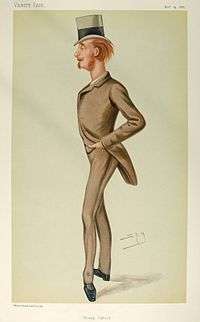Newton Wallop, 6th Earl of Portsmouth
Newton Wallop, 6th Earl of Portsmouth JP, DL (19 January 1856 – 4 December 1917), styled Viscount Lymington until 1891, was a British Liberal politician but then joined the Liberal Unionist Party in 1886. He later switched back to the Liberal Party to serve as Under-Secretary of State for War under Sir Henry Campbell-Bannerman from 1905 to 1908.
The Earl of Portsmouth JP DL | |
|---|---|
 "Young Oxford", the 6th Earl of Portsmouth when Viscount Lymington, caricature by Spy in Vanity Fair, November 1880. | |
| Under-Secretary of State for War | |
| In office 12 December 1905 – 12 April 1908 | |
| Monarch | Edward VII |
| Prime Minister | Sir Henry Campbell-Bannerman |
| Preceded by | The Earl of Donoughmore |
| Succeeded by | The Lord Lucas |
| Personal details | |
| Born | 19 January 1856 Whitchurch, Hampshire |
| Died | 4 December 1917 (aged 61) Whitchurch, Hampshire |
| Nationality | British |
| Political party | Liberal, Liberal Unionist Party. |
| Spouse(s) | Beatrice Mary Pease (d. 1935) |
| Alma mater | Balliol College, Oxford |

Background and education
Lymington was born in Whitchurch, Hampshire, the eldest son of Isaac Wallop, 5th Earl of Portsmouth, and his wife Lady Eveline Alicia Juliana Herbert, daughter of Henry Herbert, 3rd Earl of Carnarvon. He was educated at Eton College and from 1876–1879 at Balliol College, Oxford, where he was President of the Oxford Union.
Political career
Lymington was elected Member of Parliament (MP) for Barnstaple at a by-election in February 1880,[1] a seat he held until 1885 when representation was reduced to one member under the Redistribution of Seats Act 1885. At the 1885 general election, he was elected MP for South Molton and held the seat until 1891.[2]
In the latter year he succeeded his father in the earldom and took his seat in the House of Lords. From 1905 to 1908 Lord Portsmouth served as Under-Secretary of State for War in the Liberal administration of Sir Henry Campbell-Bannerman.
Lord Portsmouth was also a Justice of the Peace for Hampshire and Devon and a Deputy Lieutenant.[3]
Family
Lord Portsmouth married Beatrice Mary Pease, only child of Edward Pease of Darlington, in 1885. He died in December 1917 at Whitchurch, aged 61, and was succeeded in the earldom by his younger brother, John. The Countess of Portsmouth died in 1935.
References
- Craig, F. W. S. (1989) [1977]. British parliamentary election results 1832–1885 (2nd ed.). Chichester: Parliamentary Research Services. p. 36. ISBN 0-900178-26-4.
- Craig, F. W. S. (1989) [1974]. British parliamentary election results 1885–1918 (2nd ed.). Chichester: Parliamentary Research Services. p. 258. ISBN 0-900178-27-2.
- Debretts Guide to the House of Commons 1886
External links
- Hansard 1803–2005: contributions in Parliament by the Earl of Portsmouth
| Wikimedia Commons has media related to Newton Wallop, 6th Earl of Portsmouth. |
| Parliament of the United Kingdom | ||
|---|---|---|
| Preceded by Thomas Cave Samuel Danks Waddy |
Member of Parliament for Barnstaple 1880 – 1885 With: Thomas Cave 1880 Sir Robert Carden 1880–1885 |
Succeeded by George Pitt-Lewis (representation reduced to one member 1885) |
| New constituency | Member of Parliament for South Molton 1885 – 1891 |
Succeeded by George Lambert |
| Political offices | ||
| Preceded by The Earl of Donoughmore |
Under-Secretary of State for War 1905 – 1908 |
Succeeded by The Lord Lucas |
| Peerage of Great Britain | ||
| Preceded by Isaac Newton Wallop |
Earl of Portsmouth 1891 – 1917 |
Succeeded by John Fellowes Wallop |